
All eyes on Modi govt 3 0 first Budget
As the Narendra Modi government 3.0 prepares to unveil its first budget, the political landscape in India is undergoing significant shifts, shaping expectations and priorities for the fiscal policy ahead. This pivotal moment not only marks a critical juncture in economic governance but also reflects the broader socio-political dynamics influencing India’s trajectory.
The Context of Modi Government 3.0
Following a resounding electoral victory in 2019, Prime Minister Narendra Modi and his Bharatiya Janata Party (BJP) entered their third consecutive term in office, with promises of economic revival, infrastructure development, and social welfare reforms. However, the intervening years have seen unprecedented challenges, including the COVID-19 pandemic, which have tested the government’s resilience and policy responses.
Economic Challenges and Expectations
The Modi government 3.0’s first budget comes amid a backdrop of economic recovery efforts post-pandemic. While India has shown resilience in bouncing back from the economic downturn caused by COVID-19, challenges such as inflationary pressures, unemployment, and infrastructure deficits remain pressing concerns.
Expectations from this budget are high, with stakeholders across sectors hoping for measures that stimulate growth, boost consumer demand, and address the structural impediments to long-term economic prosperity. Key areas of focus are likely to include healthcare infrastructure, education reforms, job creation, and enhancing agricultural productivity.
Political Realignment and State Elections
The political landscape has witnessed notable realignments since the last general election. Regional parties have gained prominence, challenging the hegemony of traditional national parties. State elections in key regions have reflected these shifts, influencing policy priorities and coalition dynamics at the national level.
The outcome of recent state elections, particularly in Uttar Pradesh, Punjab, and other states, will inevitably influence the budgetary decisions. The government’s ability to navigate these political complexities while delivering on its promises will be closely scrutinized.
Social Welfare and Inclusive Growth
Social welfare schemes and inclusive growth initiatives have been central to the Modi government’s agenda, with flagship programs such as Ayushman Bharat, PM Kisan Yojana, and Jan Dhan Yojana aiming to empower marginalized communities and foster equitable development. The budget is expected to outline further investments in social infrastructure and welfare measures that address the needs of vulnerable populations.
Infrastructure Development and Digital Economy
Infrastructure development remains a cornerstone of the government’s economic strategy, with ambitious projects in transportation, energy, and digital infrastructure underway. The budget is anticipated to prioritize investments in these sectors, leveraging public-private partnerships and foreign direct investment to catalyze growth and job creation.
The digital economy is another area poised for significant investment, with initiatives aimed at promoting digital literacy, expanding broadband connectivity, and fostering innovation in emerging technologies such as artificial intelligence and blockchain.
Fiscal Prudence and Revenue Mobilization
Fiscal prudence will be crucial in the formulation of the budget, balancing the imperative of stimulating economic growth with the need for sustainable fiscal consolidation. Revenue mobilization efforts are expected to focus on rationalizing tax policies, enhancing compliance, and exploring new sources of revenue generation without unduly burdening taxpayers or businesses.
Environmental Sustainability and Climate Action
Amid growing global concerns over climate change and environmental sustainability, the budget is likely to emphasize green initiatives and climate action. Investments in renewable energy, conservation efforts, and sustainable development projects are anticipated, reflecting India’s commitment to achieving its climate goals and contributing to global efforts towards mitigating climate change.
Conclusion: Anticipating the Road Ahead
As the Modi government 3.0 prepares to present its maiden budget, all eyes are on how it navigates the evolving political landscape and addresses the nation’s economic imperatives. The budget will not only outline fiscal policies and priorities but also underscore the government’s vision for inclusive growth, social welfare, infrastructure development, and sustainable economic recovery.

In this dynamic context, stakeholders from diverse sectors await the budget with expectations of transformative measures that propel India towards prosperity and resilience in the face of global uncertainties. The decisions made in this budget will shape India’s economic trajectory and socio-political dynamics in the years to come, making it a defining moment in the governance of the world’s largest democracy.











